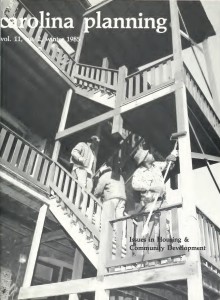 Volume 11.2 Issues in Housing & Community Development (1985)
Volume 11.2 Issues in Housing & Community Development (1985)
The 1980s ushered in a whole new set of problems for planners and analysts concerned with housing and community development. Housing assistance from the Federal Government virtually disappeared, and many previously popular community development programs lost both Congressional and popular support. Also, the incipient population shift that began in the 1970s blossomed in the 1980s — cities in the Sunbelt grew rapidly, resulting in substantial demand for housing and new infrastructure.
This issue of Carolina Planning examines some of the innovative organizational and technical responses that have emerged in the face of a bleak federal subsidy forecast and significant demographic shifts. Suggestions for new methods and strategies for attending to both types of housing problems are also offered.
Editors: Lauren D. Bachle, Stacey Ponticello, Russell Berusch, and John DiTullio
A digital version of this issue is available here.
| THE LEGAL ISSUES OF SERVING NEW DEVELOPMENT
Snyder, Thomas The article discusses legal limitations on financing infrastructure. Many private financing limitations draw fine legal distinctions in wide grey areas. Local officials must understand some of this legal reasoning presented to make informed decisions. |
| HARNESSING SUBURBAN RESOURCES
Hare, Patrick; Price, Gail The authors recast the suburban home as an economic unit; illustrating innovative ways in which recycling suburban communities can fulfill their own social service needs. |
| COMMUNITY IMPACTS OF NEW INDUSTRIAL DEVELOPMENTGoldstein, HarveyAs the industrial base of Southeastern states orients toward new, high-tech businesses, so does the need for awareness of impacts on communities. Goldstein discusses impact estimation with respect to local labor markets, occupational health, employment security, energy use, and others. |
| WILL OTHERS JUMP ON THE ROUSE BANDWAGON THIS TIME?
Ponticello, Stacey; Acker, Norman This article highlights the Enterprise Foundation; its goals, organizational structure, and methods of operations. Included is an inset explaining the relationship between the Enterprise Foundation and the Enterprise Development Corporation, a private development agency. In addition, it analyzes a successful EDC project in Norfolk, Virginia. |
| URBAN HARVEST
Hood, Tracy This article reminds planning and other city officials of the value of small-scale, less costly development options as community gardens. It lists and describes economic, educational, and social benefits from these ventures. |